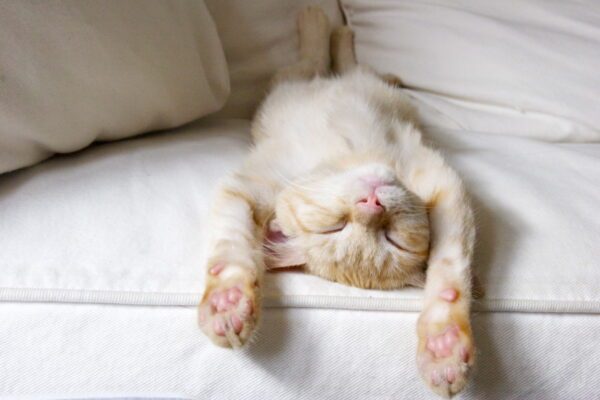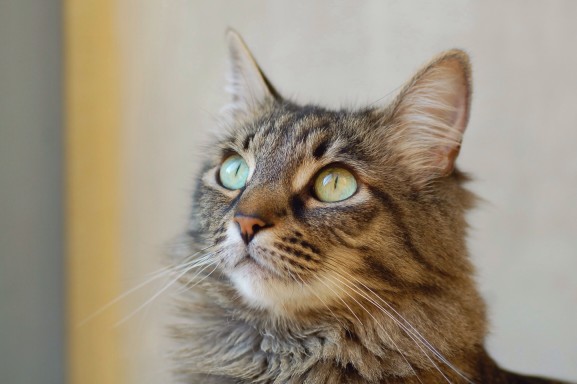It seems that the condition of your beloved cat is continually deteriorating, prompting you to look for the top-rated immune enhancer for cats.
Kitties have a relatively sensitive immune system which is why you need to be extra careful about their health. So, how to support your cat’s immune system the best way?
From a nutritious diet to ample exercise and daily supplements to regular health check-ups, boosting your cat's immune system is not a challenge.
All you need to do is follow a few simple steps and ensure that your kitty gets a healthy environment to grow.
Walk through this detailed piece and get all your answers on how to boost my cat's immune system.

How Does the Feline Immune System Work?
To completely understand how to boost my cat's immune system, you need to know how it works.
A cat’s immune system comprises white blood cells, a few body organs, antibodies, and other similar substances for fighting off infections.
These organs include the liver, spleen, and lymph nodes to capture the foreign entrants in the body. They create a space wherein all the components of the immune system work synergistically to fight the external substance.
Other organs like the thymus gland and bone marrow are the sites of white blood cell production required to fight invaders.
Additionally, cat bodies also have antibodies or immunoglobulins. These are the proteins primarily produced by B cells to respond to the new entrant in the body.
For example, a naturally occurring antibody in felines that fights against canine or dog erythrocyte antigens.
Functions of A Cat’s Immune System
Your feline friend's immune system performs multiple crucial functions to maintain balanced health. Read along for the top three:
- Recognizing foreign entrants (antigens) as and when they come in.
- Producing nonspecific and specific immunity for the common antigens and special entrants encountered previously, respectively.
- Your furball’s immune system helps protect your body from a host of antigens causing diseases and infections. These might enter your body through drugs, chemicals, organ transplants, and the environment.
Common Concerns in Cat Immune System
As a cat parent, you must know the common health concern your furball may face due to immune system deficiencies. Check out this list outlining a few of them.
Feline Panleukopenia
Caused by the parvovirus, this viral disease occurs due to a failure of the immune system in cats. It might lead to a significant rise in fungal infections like candidiasis and aspergillosis.
Your kitten is highly vulnerable to the virus through other animal feces, tears, saliva, etc.
This is a severe virus as it may also lead to death in some cases. Otherwise, the viral disease causes improper growth of the brain, failure of kidney, anemia, and other related concerns.
Kidney Failure
It leads to the deterioration of your feline's kidneys over time, hindering functions like waste removal from the body and blood purification.
Some of the prime causes of kidney failure in cats are infections, malfunction of the immune system, toxins, and cancer.
The good news, however, is that you can reverse this problem if you can get it diagnosed in time. Therefore, make sure to get regular vet check-ups and the required cat vaccinations.
Feline Leukemia Virus
This is a major disease, significantly infecting your feline's immune system. It might lead to concerns like anemia, cancer, inflammation in the mouth, and intestinal problems.
Moreover, the disease can damage your furball’s immune system, leaving your cat highly vulnerable to other diseases.
The disease is quite common in cats. In fact, this disease is so common in the US that at least 2-3% of all cats have this disease.
Feline Immunodeficiency Virus
This is a contagious virus usually caused in older cats. It affects your cat's immune system, causing infections in the urinary tract, stomach, mouth, and skin.
A few symptoms of this condition are low white blood cells, fever, and swollen lymph nodes.

How to Boost My Cat Immune System?
With the significant hike in the number of prevailing viruses, having a healthy immune system is quintessential for your kitty.
It allows your cat's body to prepare antigens that can fight off any foreign invaders and prevent diseases.
Read along to explore the best immune booster for cats.
A Balanced Diet Can Do the Trick
Nothing can beat the importance of a well-balanced, nutritious diet for your cat's immune system. Processed, unhealthy food might not provide your furry friend with all the essential nutrients.
As a result, you may not notice, but your kitty's immunity might significantly decrease.
Your best bet is to feed your kitten with quality fresh food balanced in nutrients.
It will make your feline friend healthy, prevent the risk of diseases, and keep long vet bills at bay. You may also get your cat tested and curate a special diet, such as a kidney diet for cats.
Regular Exercise Is A Must
Do you think your kitten requires exercise only to lose weight?
A regular workout is highly essential for your cat's strong immunity. It also aids in reducing stress, which can be a significant immunity killer for your kitty.
Besides, exercise prevents the risks of obesity and multiple joint problems that further weaken your furball's immunity.
Quality Supplements
To keep nutrient deficiency at bay, you can feed your furry mate some high-quality supplements. These may include herbal ingredients with a mix of vitamins and minerals or other supplements for specific deficiencies.
Some of the common examples include supplements for the shortage of vitamin C, zinc, etc.
They work by developing antibacterial, anti-parasite, and anti-viral properties in your cat. These supplements do not only help prepare your cat to fight future antigens but also help strengthen a weakened immune system.
Keep Your Cat Hydrated
Did you know dehydration in cats can be fatal? It is a severe matter that can cause medical concerns in your kitty.
Feline members may not drink water themselves as they usually get most of them from their prey. Therefore, you must feed your kitten enough freshwater directly or in the form of wet food.
Kidney failure, diarrhea, fever, diabetes, and vomiting are some of the many causes of dehydration in your cat. Make sure to increase your kitty's water intake, especially during and after a health condition.

Types of Foods to Boost Your Cat’s Immune System
Now that you have your answer for how to boost my cat immune system, here’s a deeper look into the diet section.
Remember, a healthy diet solves more than 50% of the problems!
Antioxidants
Your cat requires antioxidants to maintain a strong immune system. They not only reduce cell damage but also slow down destructive molecules.
Some common antioxidants that you can feed your cat include vitamin C, E, and A, along with zinc, magnesium, and other minerals.
Protein and Amino Acids
Cats depend on a healthy diet to meet their protein and amino acid requirements. That is because while protein is essential for your feline to build muscles and grow, amino acids are required for survival.
Taurine is one such vital amino acid that your cat may get deficient in, as it is only available in animal tissues.
Moreover, adult cats require at least 26% protein in their diet on a daily basis for growth and energy requirements.
Probiotics
Feline creatures are highly prone to digestive issues, which is why probiotics are one of the best immune boosters for cats.
They help aid diarrhea, provide the stomach with healthy bacteria, and strengthen your kitten’s overall immune system.
Fatty Acids
Though your kitten’s body does not produce essential fatty acids like omega-3 and 6, they are quintessential for the furball. They are vital for a shiny and healthy coat of a cat while also improving their immunity.
Vitamins and Minerals
A cat's prey is highly rich in vitamins, minerals, and other dietary supplements. Therefore, it is your responsibility to ensure your cat gets enough of it without having to hunt.
Vitamins like A, Bs, C, and E, along with minerals such as zinc, selenium, etc., greatly help your cat's immunity.
Summing Up
Felines do not have a solid immune system which is why your kitty may often fall prey to health conditions. Most of these problems are related either to the digestive tract or low immunity issues.
For example, kidney failure, feline immunodeficiency virus, feline leukemia virus, and other respiratory infections.
Make sure to get your cat regularly checked by a vet so you can respond accordingly. You may opt for the best diet for cats with kidney failure or add nutrients required to fight the specific virus.
So, what’s the hold? Follow a few simple steps enlisted above to ensure your kitten’s immunity stays as strong as ever!
Frequenlty Asked Questions About Cat's Immune System
What Is the Best Way to Build Your Cat’s Immune System?
Ensuring a well-balanced diet with ample exercise is the best way to build your cat's immune system. You need to feed your cat with a perfect blend of vitamins, minerals, probiotics, antioxidants, amino acids, and protein, among others.
Other practices to follow include keeping a check on weight, reducing stress levels, avoiding toxic foods, and providing necessary supplements.
What Are the Most Common Health Concerns in Cats with a Low Immunity?
If your cat’s immune system is low, its natural antibodies may weaken. As a result, they cannot fight the allergens and viruses entering their bodies.
Here are a few health conditions caused due to a weak immune system in cats:
- Feline Immunodeficiency Virus Infection
- Feline Panleukopenia
- Feline Leukemia Virus
- Cancer
- Skin diseases
As an Amazon Associate, I earn from qualified purchases. www.bestcatfoodreviews.com is a participant in the Amazon Services LLC Associates Program, an affiliate advertising program designed to provide a means for sites to earn advertising fees by advertising and linking to Amazon.com.




Leave a Reply